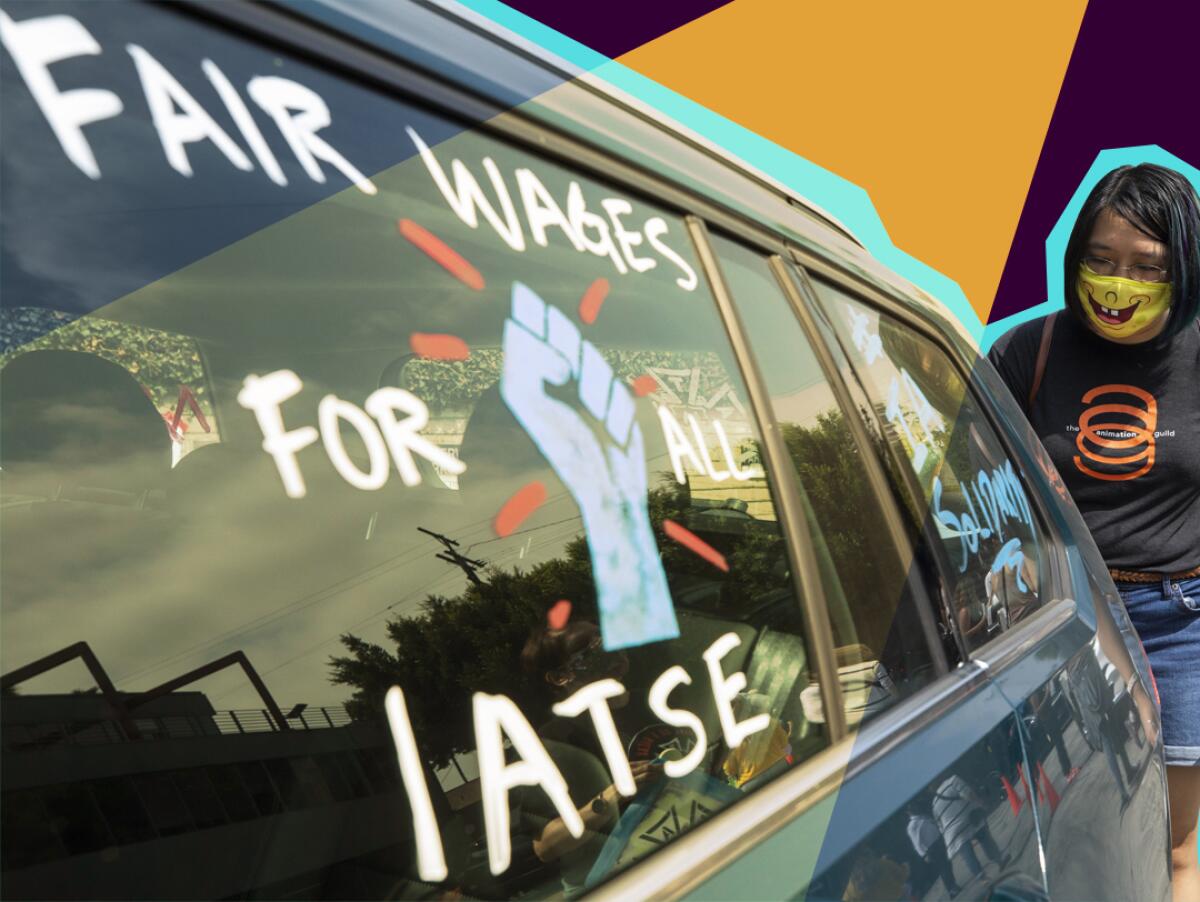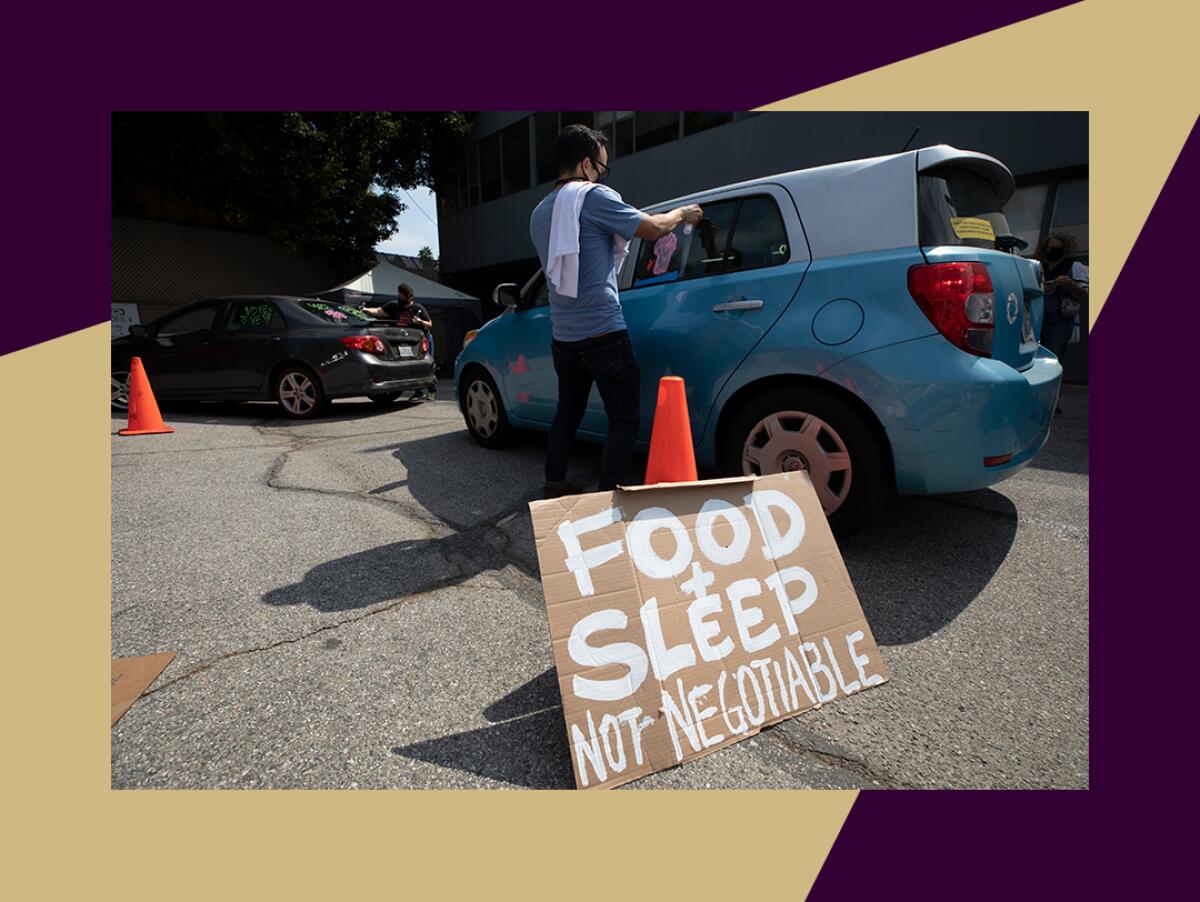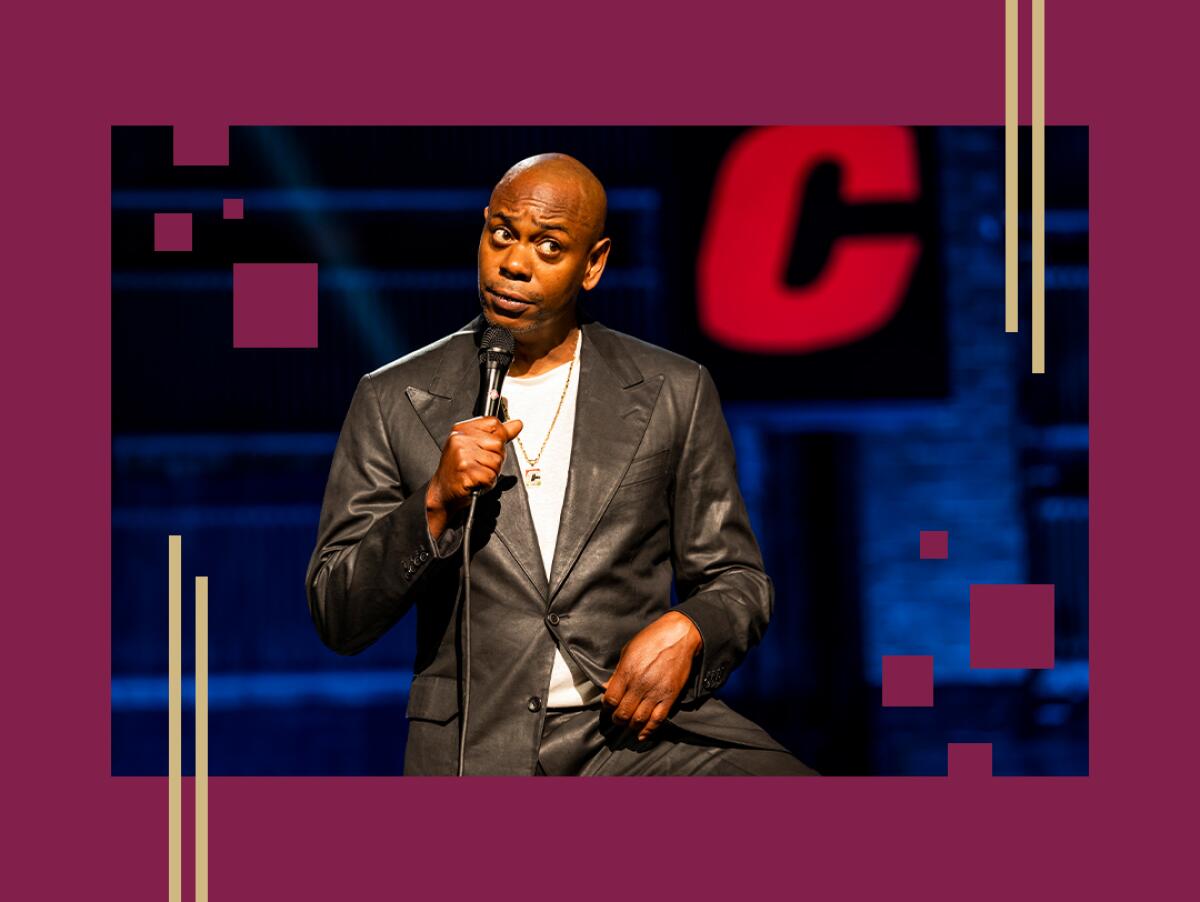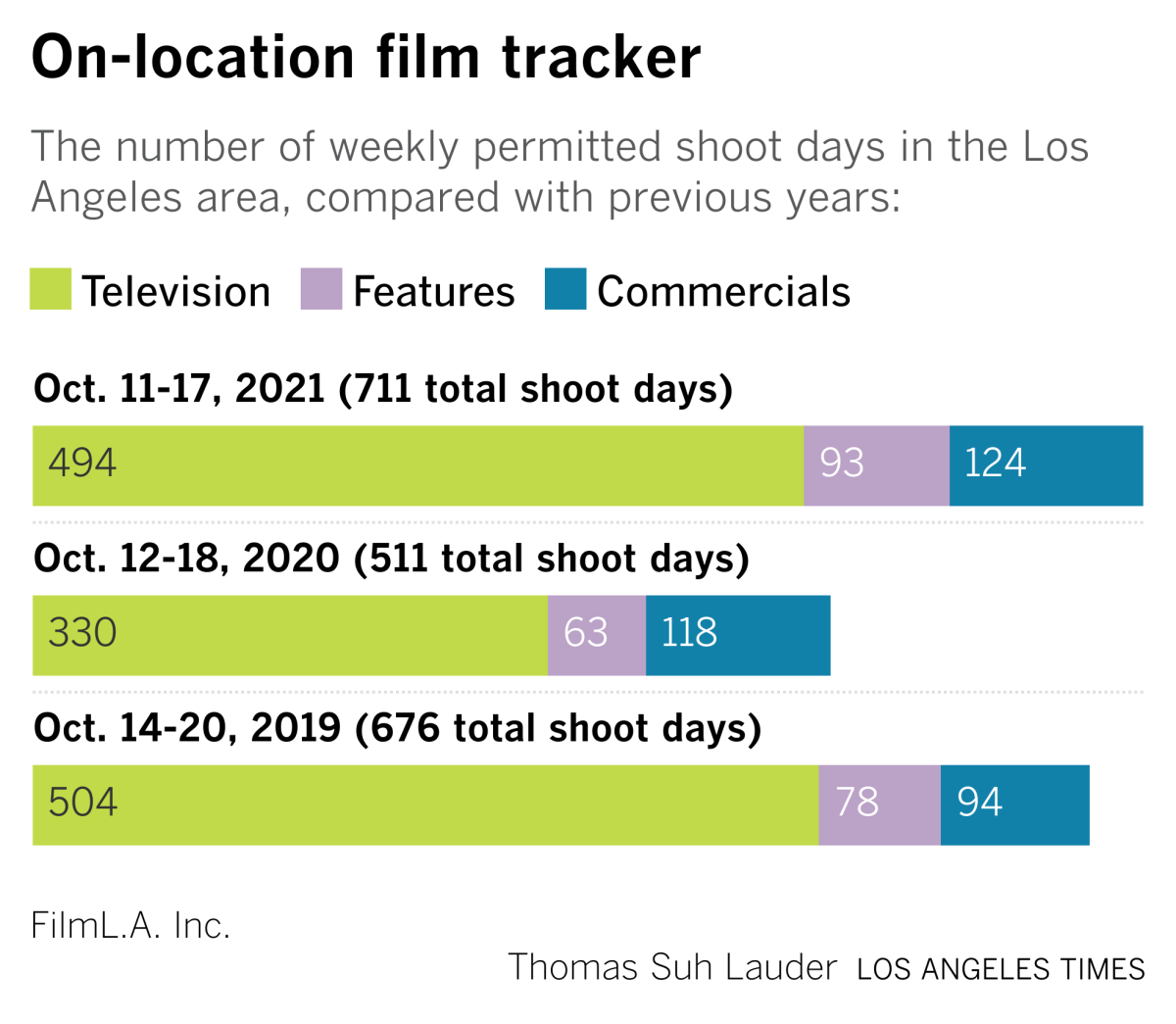Hollywood avoided an IATSE strike. But broader labor issues arenât going away

This is the Oct. 19, 2021, edition of the Wide Shot, a weekly newsletter about everything happening in the business of entertainment. Sign up here to get it in your inbox.
Hollywood may have avoided a crippling strike by crew members, but labor unrest in the entertainment industry is far from over.
After months of tense negotiations, the studios struck a deal with the International Alliance of Theatrical Stage Employees (IATSE), the union that represents sound technicians, carpenters, makeup artists, set decorators, costume designers and other so-called below-the-line workers.
Thus, they avoided the first strike in the unionâs 128-year history.
As my colleagues Anousha Sakoui and Meg James reported over the weekend, studio sources said they gave more ground than they had expected. Workers won 3% annual wage hikes, improvements in pay and conditions on streaming productions and a rest period of 10 hours between daily shoots and 54 hours on weekends.
Nonetheless, within the unionâs membership, there are unmistakable signs of dissatisfaction with the results of the fight. In an illustrative series of tweets, âDoctor Strangeâ co-screenwriter C. Robert Cargill initially hailed the deal as a âmassiveâ win for crew, before backtracking.
âHearing from some of my union buddies that they arenât too pleased with the terms of the deal and the early reports of IATSE getting âalmost everythingâ were a bit exaggerated,â he wrote. âNext few days will be critical to see if members approve the deal. Iâll stand by whatever they vote.â
Now IATSE leaders must sell the deal to the rank-and-file, which is no mere formality. About 40,000 union members from 13 Hollywood locals must still approve the pact. If they reject it, itâs back to the bargaining table.

Union officials believe the deal will be ratified by a majority of members. Nonetheless, theyâll want to make a strong case for the contract, given the amount of consternation voiced by members online, including on the IATSE Stories Instagram page.
A stew of factors led to the current situation. Sure, social media amplified long-simmering anger over 14- and 16-hour workdays, short rest periods and issues over compensation for streaming shows and movies.
Donât, however, underestimate the lingering effects of the COVID-19 pandemic, which combined with a surge in demand for content that the media industry giants can use to grow their streaming arsenals.
Pandemic protocols â agreed to last year by the studios and unions â made shoots longer, harder and more stressful. Coupling that with increased pressure to ramp up production turned out to be a recipe for strife. Many producers voiced support for IATSE.
âThe reaction that IATSE is having now is fundamentally about protecting their own from a safety standpoint,â said film, TV and theater director Michael Pressman, most recently executive producer of âChicago Med.â âNo one can fault the IA on this one, because people risked their lives this past year. I couldnât live with myself if someone got sick and died on our show. No one couldâve lived with it. I still live with that fear in the back of my mind.â
Some studio sources have acknowledged not fully anticipating the level of worker angst. Pressman said the disconnect between labor and the higher-ups was avoidable.
âI think IA and all the crews wouldâve felt differently if a studio head or representative from production had spent a week on set with a mask and shield on,â Pressman told me. âIf someone couldâve been in our shoes from the studio side and walked in solidarity and shared the risk, this mightâve been a different negotiation on both sides of the table.â
Whatâs happening in entertainment is similar to the dynamics unfolding more broadly across the U.S. labor force â people are reevaluating their relationship to work.
Theyâre demanding more of their employers, even if it means potentially tanking their careers. Weâre seeing it across the country, including among the 10,000 Deere & Co. workers, who went on strike last week after rejecting a tentative contract negotiated by their union.
In a very different sense, the non-unionized employee revolt at Netflix over the latest Dave Chappelle comedy special is another example of workers feeling emboldened to speak out against employers.
Itâs possible that those IATSE members posting online represent a small yet vocal minority. Thereâs no way to know until a vote occurs. Many workers are still waiting for more details to help digest the terms of the agreement. But if enough workers believe the union is overly willing to bend to the studios, that could lead to more intense debates over future contracts.
Turmoil over working conditions and fair pay in streaming productions will persist in Hollywood no matter the outcome of the IATSE vote. The Writers Guild of America, historically much more apt to strike than below-the-line workers, will surely watch closely to see how the IATSE contract debate unfolds. WGAâs own contract comes up for renegotiation in 2023.
Stuff we wrote

â Netflix took a PR hit over the fallout from Dave Chappelleâs latest special, âThe Closer,â and his disparaging remarks about transgender people. Ted Sarandosâ response to the controversy, particularly his contention that âcontent on screen doesnât directly translate to real-world harm,â is taking a lot of heat, especially after Netflix has made such a big deal out of its diverse and inclusive programming.
But, as Wendy Lee and Christi Carras note in their story on the imbroglio, some industry experts believe Netflix is making the right choice by standing with the artists with whom it works, regardless of the blowback. The company reports earnings Tuesday. A walkout by employees is planned for Wednesday morning.
â Speaking of Netflix, hereâs a revealing story by Victoria Kim: The seedy world of private lending in âSquid Gameâ is a real temptation in South Korea.
â Dawn Hudson will step down as CEO of the Academy of Motion Picture Arts and Sciences when her contract expires in May 2023, âafter 10 transformative â and at times tumultuous â years at the helm,â as The Times put it.
â This Hollywood fight coordinator survived a brutal accident â then came a conservatorship battle. âI wanted my life back,â Nigel Hudson, a former trainer to the stars, tells The Timesâ Stacy Perman in this in-depth piece.
â The beef goes on, the beef goes on. Cher wants her Sonny and Cher royalties, and sheâs suing Bonoâs widow to get them.
â The latest in our Explaining Hollywood series: How to get started as a voice actor.
Optimistic quote of the week
âWeâll be able to fund and build out our own IP â itâs aspirational â but much in the way that Disney does. Itâs aspirational, itâs arrogant. But arrogant aspiration is what leads to things getting built.â
â Maverick Carter after his and LeBron Jamesâ SpringHill Co. secured a big minority investment from a group led by RedBird Capital Partners that valued the firm at $725 million.
On the numbers

Horror movies are better in theaters. Thatâs not a debatable point. Also, âHalloween Killsâ is a sequel to a generally well-received reboot of one of the genreâs greatest franchises. So itâs not really a mystery why the new movie did so well at the box office, despite also being available to Peacock subscribers.
Still, itâs just too tempting to overanalyze the strong opening weekend performance of âHalloween Kills,â so here we go.
The $50.4-million domestic opening was the latest test of whether moviegoers would buy tickets even if the movie was available on a subscription streaming service. As with Warner Bros.â âGodzilla vs. Kong,â which debuted with $31.6 million on the same weekend as its HBO Max unveiling, the answer is âyes.â
A couple things. One possible reason why Peacock streams didnât seem to eat into box office much: Not that many people subscribe to Peacock. The more likely explanation is that âHalloween Killsâ is yet another example of a post-pandemic pattern. If studios release movies people want to see in theaters, audiences will go. Meanwhile, movies that audiences donât want to see tend to bomb no matter how theyâre released.
Ridley Scottâs âThe Last Duelâ is well-reviewed and isnât available to stream or rent, but it was DOA with $4.8 million in the U.S. and Canada. Itâs yet another bit of bad news for anyone who says they want more non-franchise Hollywood movies at theaters. But the audience is speaking.
Overthinking, done. At least until âDuneâ comes out ...
Bonus numbers:
- Deloitteâs latest digital media trends survey says âchurn and returnâ behavior is most common with younger generations when it comes to streaming: 47% of millennials and 37% of Gen Z canceled and resubscribed to the same streaming video service later the same year. Only a quarter of Gen Xers and 6% of boomers did this.
- Sony Pictures on Monday sold its GSN Games division to mobile game maker Scopely for $1 billion in cash and stock.
- Hollywood production: Shoot days in the Los Angeles area for the three main categories were up 39% last week compared with the same period last year and up 5% compared with 2019.

More stories you should read
â With the Warner Bros. Discovery merger, David Zaslav is angling to become Americaâs king of content. Joe Pompeoâs Vanity Fair profile of the Discovery CEO is making the rounds. Among the quoted: Oprah, Nancy Pelosi and Steven Spielberg.
â Cause: At Axel Springer, Politicoâs new owner, allegations of sex, lies and a secret payment. (NYT) Effect: Axel Springer has relieved Julian Reichelt of his duties.
â Phil Collins sets off a new battle over the Alamo. The Texas landmark is getting a new museum thanks to rock starâs donation; the gift has triggered broader questions about how best to remember the Alamo. (Wall Street Journal).
Final shot...
Weâre deep into October, so Iâm soliciting offbeat horror movie and TV recommendations from the Wide Shot audience. I was initially shocked how many people online swear by âNightmare on Elm Street 3: Dream Warriors,â but I didnât regret giving it a try. Some legitimately terrifying moments, the return of Nancy and the charmingly oh-so-1987 special effects make it very much worthwhile. Send me your picks!

Inside the business of entertainment
The Wide Shot brings you news, analysis and insights on everything from streaming wars to production â and what it all means for the future.
You may occasionally receive promotional content from the Los Angeles Times.




